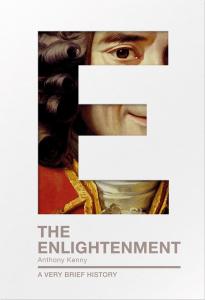Yet another book in SPCK’s series of “Very Brief Histories” (Byzantine Christianity previously covered here), Anthony Kenny’s survey of The Enlightenment is excellent, thoughtful, and, well, brief.
This book is divided into two parts, a longer history (~100 pages) and a shorter reflection on the legacy of the Enlightenment (~20 pages). Beginning his narrative with the Battle of Culloden Moor on April 16, 1746 (in Kenny’s view, the last gasp of Medievalism as Bonnie Prince Charlie attempted to retake the English throne for the Stuart family and for Roman Catholicism) and ending on December 2, 1804 (the date of Napoleon’s coronation as Emperor), Kenny hits several of the major ideas and thinkers of the 18th century portion of the Enlightenment. And while I would quibble with his starting point (I think we at least have to go back to Descartes, Hobbes, Locke, and Newton), it can’t be argued that this little book has included the apex of the high points of the movement.

What’s more, he has covered this ideas and thinkers clearly and in a way that will be accessible to the layman and interesting to the specialist. Kenny’s prose is simultaneously warm and crisp, and he has a clear command of the material. If you are starting a study of the Enlightenment proper, this is the place to do it.
The biggest hesitation I’ve got with the book is that while Kenny briefly touches on the disagreements Christians have had with the Enlightenment—and there have certainly been many—–he spends rather more time focusing on the surrender of mainline Protestants and Roman Catholics to the Enlightenment project.
“Nowadays it is not in Rome or in Canterbury that one finds the early chapters of Genesis taken literally, but in the fundamentalist evangelical churches that have proliferated, especially in the United States. In such communities, it is common to speak with disdain of ‘the enlightenment project.’ But within traditional, mainstream Christian communities, the Enlightenment can fairly claim to have made many of its points.” (109)
This is of course true, insofar as many of these communities—especially those headed by Rome and Canterbury—have long since abandoned any meaningful belief in the Gospel and replaced it with Enlightenment philosophy (regardless of their interpretation of Genesis 1-11). But it doesn’t tell the whole story on the “fundamentalist” side. It’s true, that many contemporary “fundamentalists” (by which I assume he means what we would call “Evangelicals,” as well as actual fundamentalists) have rejected many of the premises of the Enlightenment. But it’s also true that both contemporary Evangelicals and our proto-Evangelical forebears have a much more complicated relationship with the Enlightenment than the simple acceptance/rejection dichotomy.
For example, we might think of Jonathan Edwards, who incorporated the method of John Locke into at least some aspects of his theology. Granted, Kenny gets around this to some extent by starting the Enlightenment somewhat after Locke’s time. But Edwards is in that stream and is certainly well within the timeframe set by the book. Or, even more relevant, we might consider Cotton Mather. The famous witchhunter’s book on philosophy was an integration of Newtonian physics with Christian doctrine. Again, this was technically before the time outlined by the book, but the influence of both Mather and Edwards on later generations of American thinkers is incalculable (and while I’m less familiar with the development of Evangelical theology on the continent, I can’t imagine there aren’t similar streams of thought there).
Even in our own day, for all the argument between Evangelicals and contemporary biology (which is, as Kenny points out, not exactly an “Enlightenment” affair, given that Darwin came later), there are still many points of cooperation and agreement with the sciences. While Evangelicals might be suspicious of biology, for example, chemistry and physics they are quite comfortable with. (And even to say that Evangelicals are at odds with biology can be a stretch. We shouldn’t forget that the head of the human genome project was an Evangelical Christian.) We might object to Darwin at times, but we’ve yet to turn our backs on Newton or Boyle…
All that to say that yes, Christianity and the Enlightenment are at odds in key fundamental assumptions (the role of God, the inspiration of Scripture, and human nature, as just a few examples). But that’s not to say that there are no points of cooperation at all. It may just be that such points of cooperation are too small or obscure to be worth noting in a survey of the period.
That caveat may have taken more space than it was worth. To return to the main point: The Enlightenment is excellent and worth your time.
Dr. Coyle Neal is co-host of the City of Man Podcast and an Associate Professor of Political Science at Southwest Baptist University in Bolivar, MO. How Enlightened he is, is probably up for debate.












